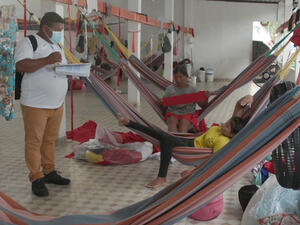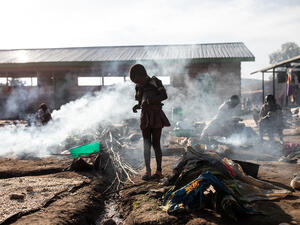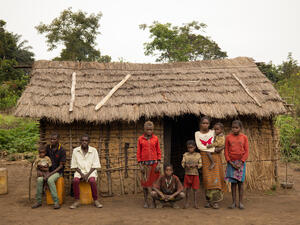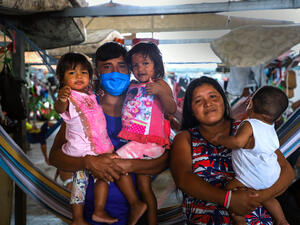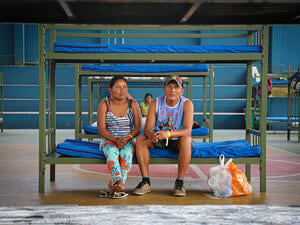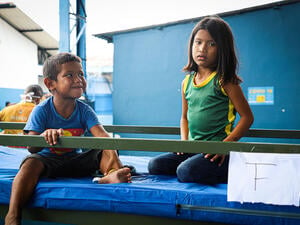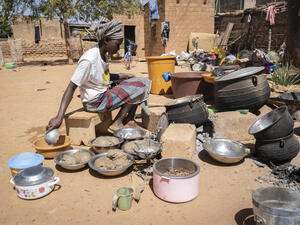Hundreds of indigenous Embera people flee from armed group in Colombia
Hundreds of indigenous Embera people flee from armed group in Colombia
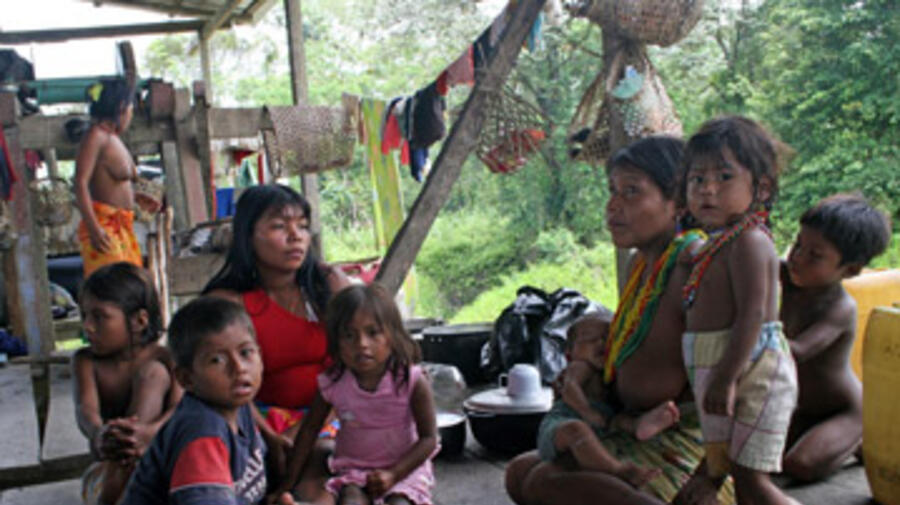
Some of the displaced Embera women and children in a cramped shelter.
RÍO BAUDÓ, Colombia, April 10 (UNHCR) - More than 2,000 indigenous Embera people have fled their collective territory in the jungles of north-west Colombia since the arrival there a month ago of a newly formed irregular armed group. A UNHCR team heard evidence of physical abuse and rape by the group.
The displaced Embera, coming from 25 communities, have taken shelter in half-a-dozen locations along the Baudó River in Colombia's Chocó department. Humanitarian assistance is available in some places, but has yet to reach the more remote villages.
The Chocó rainforest extends more than 1,000 kilometres along Colombia's Pacific Coast, across the border with Panama and north to the Caribbean. Its strategic location and wealth of natural resources make it prime territory for irregular armed groups. Troops from the national armed forces control most entrance and exit points.
A newly formed armed group of 200 men arrived in the area in early March and moved upriver, fighting the local guerrilla group for control of the territory. The intruders grew increasingly violent against the indigenous civilian population.
During a mission to the area last week, a UNHCR team interviewed some of the displaced people about the violence. In one community, UNHCR met a group of 14 men and teenagers who said they had been tied up, threatened and badly beaten.
In another community, two boys aged 13 and 14 said they were kidnapped for several days and forced to act as guides in the surrounding jungle. In each case, the abusers were trying to get information about the whereabouts of the rival guerrilla group.
UNHCR is also extremely concerned at the reported cases of systematic sexual violence committed against Embera women. The refugee agency heard evidence of two cases of rapes, two attempted rapes and a mass rape. There could be more cases that are not being reported because of the cultural taboo.
"I was washing clothes in the river when they arrived," a young indigenous woman recounted. "Two men grabbed me by the neck, but I managed to slip through and they were left with just my shakira [a traditional beaded necklace] in their hands. I grabbed my baby and ran into the jungle."
UNHCR strongly condemns these acts as violations of international humanitarian law and calls on the Colombian government to strengthen interventions to protect local populations, and to prevent more forced displacement of indigenous people.
Today, 25 indigenous communities along the Baudó River - all of them part of Embera collective territory - stand empty after their inhabitants fled by canoe or on foot. "People panicked and ran where they could; some got lost. An old man from our community got separated from the group and was bitten by a snake. When we found him in the morning he was dead," one Embera leader said.
Most of the people from these communities have found shelter in other Embera communities, such as Catrú, Playita and Nuncido, but many people remain unaccounted for a month after their flight.
The small hosting villages have in some cases doubled in population size. In all places, there is a shortage of food and shelter. Everywhere medical attention is short, with an almost complete absence of civil state authorities.
The UNHCR mission found the community of Nuncido, with 185 displaced people swelling the population to almost 600, to be in urgent need of attention. Because of its remote location up a tributary of the Baudó River, it has so far received no assistance from local or national authorities. In all communities there is great need for psycho-social support for the victims.
Some of the displaced have found refuge in non-Embera villages along the Baudó. In some, like Puerto Meluk, there are serious health concerns due to the cramped shelter conditions. Diarrhoea and pulmonary infections are widespread among small children and a four-day old Embera baby died last week in Puerto Meluk. There are also cases of tuberculosis, as well as chronic malnutrition.
In all locations, UNHCR met with local authorities to report their findings and urge the need for prompt action. Beyond concerns about urgent humanitarian assistance, UNHCR is also worried about the long-term prospects for the Embera communities in the area.
Fearing that the Embera could continue to be victims of abuse, retaliations and pressure, UNHCR is working with leaders of the indigenous communities to help them formulate and put in place effective prevention and protection plans.
At least 27 indigenous groups are considered to be at risk of extinction in Colombia, largely as a result of armed conflict and forced displacement. Their survival depends greatly on being able to remain on their traditional lands. In a January ruling, Colombia's Constitutional Court gave local and national authorities six months to report on actions taken to protect endangered indigenous communities, particularly in the Baudó region.
By Marie-Hélène Verney in Río Baudó, Colombia

